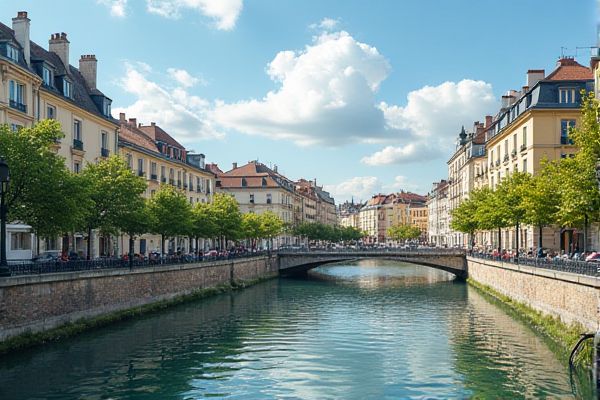
What to know as new resident in France: Understanding French language basics. Navigating public transportation. French healthcare system registration. Cultural etiquette and customs. Renting accommodation processes. French visa and residency requirements. Opening a French bank account. Costs of living differences. Finding local social groups. Emergency contacts information.
Understanding French language basics.
To understand the basics of the French language as a new resident in France, it is essential to focus on learning greetings, introductions, basic grammar like nouns, verbs, and pronouns, along with essential vocabulary and pronunciation. Engaging in basic French conversations and interacting in everyday situations, such as talking to shopkeepers or asking questions like "Ca va ?" and "Comment tu t'appelles ?", is crucial for navigating daily life in France. A structured course, like Lawless French for Beginners, is highly beneficial for mastering around 100 basic French words and phrases needed for essential situations like ordering food or asking directions. By understanding key verbs, pronouns, and common expressions, you can communicate effectively and seamlessly integrate into French society.
Navigating public transportation.
To navigate public transportation in France, particularly in cities like Paris, you can use the extensive metro network with 16 lines and over 300 stations, the RER for regional travel, trams for outer city areas, and buses for comprehensive city coverage. Tickets and passes, such as the Paris Visite Pass, can be purchased at stations or through local public transport apps, and must be validated before use to avoid fines. For more comprehensive information, visit Paris Je T'aime, which offers detailed guidelines and tips for using public transportation in Paris.
French healthcare system registration.
To register for the French healthcare system, you must have lived in France for at least three months. After this period, you can apply through your local CPAM office with essential documents including your passport, proof of residence, and proof of income. Additionally, choosing a primary care doctor is necessary, along with obtaining a Carte Vitale for healthcare access. For detailed guidance on this process, visit the French Healthcare System guide on Expatica.
Cultural etiquette and customs.
In France, cultural etiquette is paramount; residents should greet everyone upon arrival and departure, dress well for social events, follow strict table manners, and avoid eating or drinking while walking. Invitations to homes are considered honors, and formal greetings and polite language are essential in all interactions. For further insights on French social norms and practices, visit the Cultural Atlas to explore the nuances of French culture and etiquette.
Renting accommodation processes.
To rent accommodation in France, it's essential to prepare a comprehensive dossier that includes key documents such as your ID, proof of address, the last three pay slips, and your work contract. Additionally, having your last tax notice and other pertinent documents like a residency card for expats or student ID for students is crucial. In some cases, you might need a guarantor, particularly if your dossier is incomplete or if you are self-employed. Renting from a private landlord can provide more flexibility in document requirements, making it a beneficial option for many. For a deeper understanding of the process, including how to prepare your dossier and the role of a guarantor, you can refer to this guide on Renting in France, which covers these aspects in more detail.
French visa and residency requirements.
To become a resident in France, non-EU and non-EEA citizens must obtain a long-stay visa (VLS-TS) or a residence permit, meeting specific requirements such as proof of financial resources, health insurance, and housing, and must validate their visa and sign a Republican Integration contract. After the initial visa period, they must apply for a Carte de Sejour, and after five years, they can apply for a ten-year residence permit or French citizenship.
Opening a French bank account.
To open a bank account in France, you need identification, proof of address, and proof of residence status. You must be 18 or older, and for non-residents, the process is more complex with stricter eligibility criteria and higher fees. You can also consider opening an account online with banks like N26, which offers a simpler and faster process.
Costs of living differences.
In France, the cost of living varies significantly depending on the location, with major cities like Paris and Lyon being considerably more expensive than smaller towns or rural areas. For example, rent for a one-bedroom apartment in city centers can range from EUR600 to EUR1,100 per month, while groceries and utilities also vary in cost, with a single person needing a monthly budget of EUR1,500 to EUR2,000 to live comfortably, excluding rent. For more detailed information on this topic, you can explore the France Cost of Living Guide which provides comprehensive insights into various living expenses across the country.
Finding local social groups.
Join various expat groups in France, particularly in Paris, through Meetup, which offers a diverse range of groups including language exchanges, sports activities, cultural events, and social meetups to help new residents connect with like-minded individuals.
Emergency contacts information.
In France, key emergency numbers include 15 for medical emergencies (SAMU), 17 for police, 18 for the fire brigade, and 112 as the Europe-wide emergency number. Additionally, 114 is available for deaf or hard of hearing individuals to send text messages to emergency services. For more detailed information on these essential numbers and other specific services, the Expatica website provides a comprehensive guide to French emergency contacts.
